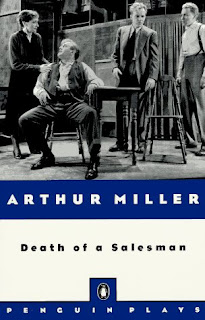“Oh, the ludicrousy of it all! The supreme senselessness!”
These words seem all too appropriate as she stands stunned, possibly trembling, her ill countenance toward the earth her once-living husband now lays beneath, the man she loved to, and beyond, death. On the last page of Arthur Miller’s Death of a Salesman, widowed Linda stutters to herself, informing her dead husband, “I made the last payment on the house today. Today, dear. And there’ll be nobody home...” And in penetrating ambiguity announces, “We’re free and clear... We’re free... We’re free...”
There in the margin I wrote, “Freedom and Death”... Linda's peculiar "We're free" lodged itself in my thinking.
In regards to Linda, what was she saying there by the grave? What kind of freedom was this? Was it not hugely ironic? I suppose on the one hand, Linda is “free” from her relentless mortgage payments, the bills that landed monthly in the mailbox. She is “free” to enjoy her home without the pulsing anxiety that this time next month the same amount is due, again. A “freedom” many Americans would die for - pun intended.
And yet, what is freedom without the one you love? Is she now “free” to be alone, in some house she once called home, though she would gladly choose life for her husband above all else? Is she “free” from Willy, even as she longs for him?
And what about Willy? What kind of freedom is he offered? Is he free to enjoy the peace of having paid off his house, to take up time of leisure and plant a garden, read a book, mow the grass, clean the kitchen? Or did his freedom show up as the end of life itself, the end of memory, romance, and faith? What kind of freedom, if any, lies in death?
So: Does death bring freedom? If yes, what kind? And, more urgently, could it be obtained while one still lives? Is there freedom in life? This is the question haunting me at the moment.
See, because I don’t want freedom after I’m dead - I’m not so sure there is such a thing. Freedom, if anything, must be a category of the living, for death would be the end to freedom itself.

